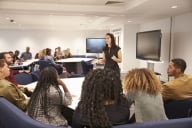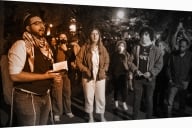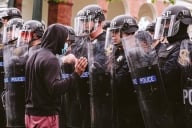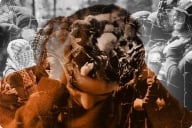You have /5 articles left.
Sign up for a free account or log in.
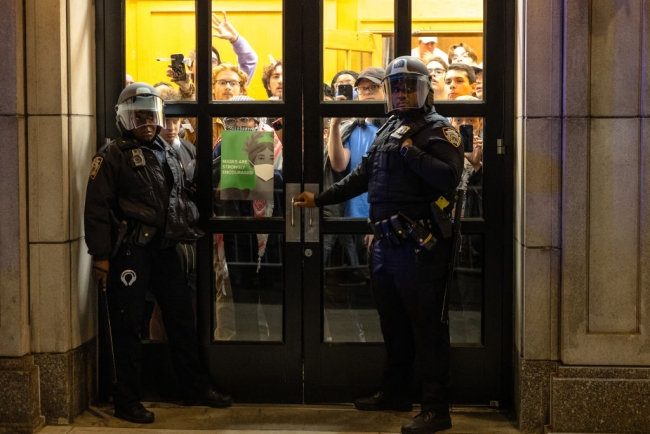
Police prepare to enter Columbia University’s Hamilton Hall and remove student protesters on April 30.
Michael M. Santiago/Getty Images
In Pictures: Campus Protests
NYPD Enters Building at Fordham
New York City police officers entered an academic building on Fordham University’s Lincoln Center campus Wednesday around 5 p.m., arresting dozens of pro-Palestinian students camped out in the lobby.
University staffers had draped a tarp over the windows shortly before the NYPD arrived in an effort to shield any arrests from view.
“Why are you hiding?” protesters yelled from outside. “Shame on you for this!”
The students did not resist, putting their hands behind their backs and peacefully accepting the zip-tie handcuffs. Many had been suspended just a few hours earlier, according to the The New York Times; they flaunted their suspension letters through the floor-to-ceiling windows of the Leon Lowenstein Center for the more than 100 fellow demonstrators amassed outside.
Matthew Smith, a freshman at Fordham’s Bronx campus, told The Times he had come down to Manhattan early this morning when he found out about the encampment. “When we saw what they did to Columbia, it really emboldened us,” he said. “Seeing what the Columbia students went through, it’s inspiring.”
—Jessica Blake, 7:30 p.m.
Manhattan DA Unsure How Many Arrested Were ‘Outsiders’
Manhattan District Attorney Alvin Bragg told CNN he does not have a breakdown of who among the estimated 300 people arrested at Columbia University and the City College of New York this week were outsiders.
It’s “certainly something we will learn as we proceed,” Bragg said. “My impression in real time was that these cases are going to come to this office and we’re going to do what we always do, which is apply the facts to the law.”
CNN also noted that the NYPD gave the names of those arrested inside Columbia’s Hamilton Hall to university authorities, who will check them against their records to determine how many were students.
Mayor Eric Adams explicitly argued at a press conference this morning that it was “outside agitators” who co-opted the barricade of Hamilton Hall.
—Jessica Blake, 7:00 p.m.
An Update From UW-Madison, And a Comment From Trump
Tents are back up on the Library Mall at the University of Wisconsin’s flagship campus in Madison, just hours after law enforcement officers tore them down. The university ordered the intervention, which ended in the arrest of 34 protesters. But it didn’t dissuade hundreds from reassembling in the same space, locking arms and proudly displaying “Free Palestine” signs.
Police officers looked on from the outskirts of the revitalized encampment.
One of those who returned to the site was sociology professor Samer Alatout, a Palestinian native who was seen on social media bleeding from the forehead as he was restrained by police this morning. He told Liam Beran, a former UW student news editor, that police are “singling out” people of color.
“I saw the police pointing at me and saying, ‘We want him,’” Alatout said.
According to a statement from the university, the majority of the protesters arrested this morning were released with no citation issued. Only four were booked into the Dane County Jail. Alatout was not listed in the university’s statement, but he told local reporters that he was cited.
Four police injuries were reported—all stemming from physical confrontation with protesters, the statement noted.
Former president Donald Trump chimed in from a campaign stop in nearby Waukesha, where he called out all campus protesters and praised the police response.
“To every college president, I say: Remove the encampments immediately, vanquish the radicals and take back our campuses for all of the normal students who want a safe place from which to learn,” Trump said.
—Jessica Blake, 6:30 p.m.
A Deal Falls Through at Portland State
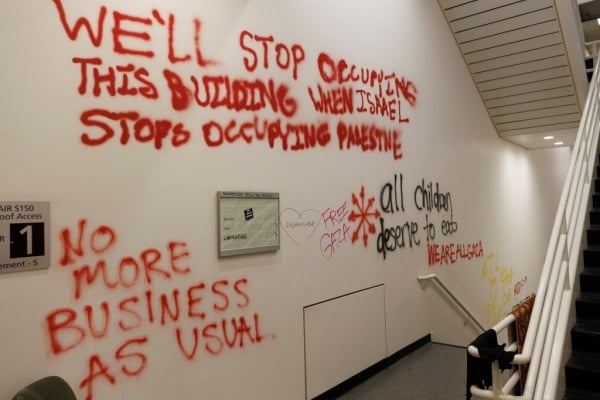
Graffiti lines the walls of Millar Library at Portland State University.
Photo by JOHN RUDOFF/AFP via Getty Images
An attempted deal between administrators and protesters occupying the library at Portland State University fell through in the early hours of Wednesday morning, though about 50 protesters left on their own, according to a message to the campus community from president Ann Cudd.
Earlier, Portland Police Chief Bob Day told CNN that between 50 and 75 protesters occupied the Branford Price Millar Library on Monday, prompting the campus to close for two days. Photos taken inside the building show graffiti, broken glass and barricades made of chairs, KGW8 reported.
Cudd said in her statement that protesters agreed to leave the library at 1:30 a.m.; in exchange, she promised they wouldn’t be suspended or expelled and the university wouldn’t file criminal charges. She also said she offered to make a personal donation to the Middle East, North Africa, South Asia (MENASA) Student Center at Portland State and to “to support faculty efforts to include scholarship and creative works related to Palestine in PSU’s Race and Ethnic Studies Requirement.”
However, protesters didn’t sign the agreement as planned.
“I feverishly wish that the students in the library had signed on to our agreement, but, after their negotiators told us they had a deal, they apparently chose not to sign,” Cudd said.
CNN reported that few students appeared to have remained in the building.
Protesters pushed back on Cudd’s account of events in a post on Instagram, arguing that the president couldn’t promise them amnesty and hadn’t met their demands, including “that the president come out and demand a ceasefire” and “condemn the occupation and genocide of the Palestinian people.”
—Sara Weissman, 6:00 p.m.
Northwestern Advisory Committee Members Step Down
Seven members of a Northwestern University advisory committee on preventing antisemitism have stepped down, the student-run Daily Northwestern reported. The group attributed the move to President Michael Schill’s decision not to consult them before he reached an agreement with pro-Palestinian protesters allowing them to stay on Deering Meadow as long as they take down all tents.
“It is essential that the University develop appropriate and timely recommendations to address and prevent antisemitism and hate,” the members wrote in a letter obtained by the student newspaper. “However, in light of the University leadership’s decision not to utilize the committee for its stated purpose, we can no longer continue to serve in this role.”
Jon Yates, Northwestern’s vice president for global marketing and communications, confirmed their resignation, saying the university was “disappointed” by the decision. He noted that the committee’s charge remained “incredibly important.”
“Our commitment to protecting Jewish students, faculty and staff is unwavering. The University has no tolerance for antisemitic or anti-Muslim behavior,” Yates wrote in an email to Inside Higher Ed. “We will continue to engage with all members of the Committee—including the members who have resigned—and other Jewish members of our community, to ensure the vital objectives of this committee continue.”
—Jessica Blake, 5:25 p.m.
Emory Students Occupy Admissions Building
A group of student protesters has occupied the admissions building at Emory University, where Atlanta police violently arrested dozens of students and faculty members last week.
Shortly after students took the building this afternoon, an Atlanta bomb squad was seen patrolling the area, according to local news footage.
The occupation comes after last night’s police invasion of Hamilton Hall at Columbia University, where students had barricaded themselves following breakdowns of negotiations with university leaders.
Campus protesters have used building occupations and sit-ins as a messaging tactic for years, and it has only intensified in recent weeks. UT Dallas students organized a sit-in outside the president’s office last week. Yesterday, University of New Mexico students occupied the Student Union building until police breached the entrance and arrested 16 students. Students at Cal Poly Humboldt occupied Siemens Hall and other campus buildings for over a week before police broke down barricades and arrested 31 students on Tuesday night.
Emory’s appears to be the first university where students have targeted the admission office. Caroline Fohlin, the wife of Dean of Admissions John Latting, was one of the faculty members assaulted and arrested during the police sweep of the student encampment last week.
—Liam Knox, 4:50 p.m.
House Republicans Hold Press Briefing at George Washington U.
Citing concerns about campus protests across the nation, House Republicans walked through a pro-Palestinian encampment at George Washington University ahead of next week’s hearing with D.C. Mayor Muriel Bowser, who will be on the hot seat after she declined a request from university officials to send police to sweep the site, reportedly because of concerns about optics.
In a press conference following the meeting, GOP officials emphasized the need for student safety, arguing the encampment has been disruptive as GWU nears the end of the semester.
“The university president explicitly told us in a briefing they do not want these encampments on their campus,” House Oversight Committee Chairman James Comer said during the briefing.
The members of Congress were met by students carrying pro-Palestinian signs, and their comments were at times drowned out by singing and the chanting of anti-war slogans. Counter-protesters holding pro-Israel signs were also spotted at the GWU encampment. The lawmakers were pressed on all sides as they walked through the encampment, fielding questions from press and clashing with pro-Palestinian protesters calling for an end to the war.
In one testy exchange, former faculty member Zein El-Amine clashed with House Republican Byron Donalds of Florida, calling the Congressman a “race traitor” and “Uncle Tom.”
He also accused Reynolds of being an “outside agitator.”
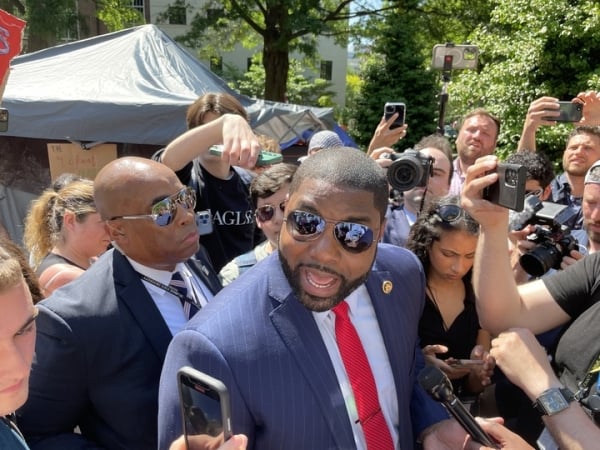
Congressman Donalds clashes with protesters on a walkthrough of the protest encampment at GWU.
Josh Moody
“How much is [the American Israel Public Affairs Committee] paying you, you bastard?” El-Amine yelled as Reynolds walked through the encampment.
“That guy is really old to be in college,” Donalds quipped in return.
In response to a question from Inside Higher Ed about how college presidents should respond to the protests across the nation, Donalds said leaders need “to take control of their campuses” and that “they have a responsibility for all students to be safe.”
The press briefing and walkthrough followed a roughly hour-long meeting with GWU leaders.
—Josh Moody, 4:30 p.m.
UVM To Disclose Investments
Officials at the University of Vermont announced that they will take a step toward addressing the divestment demands of pro-Palestinian protesters by disclosing before the end of the week where the institution invests its endowment.
According to VTDigger, the move follows conversations between students and provost Patricia Prelock Tuesday evening, during which Prelock also agreed to present to the leadership team student concerns about the scheduled commencement speaker, U.S. ambassador to the United Nations Linda Thomas-Greenfield.
Protesters have said the choice of speaker is “insulting,” given that the U.S. vetoed three U.N. resolutions calling for a cease-fire in the Israel-Hamas war.
“Forty thousand people have been murdered in Palestine, and they invited the woman who allowed that to continue to happen,” one fourth-year student told a crowd through a megaphone Monday afternoon. “We’re going to organize and tell them that we will not stand for this.”
Despite the olive branch extended by university leaders, students in a pro-Palestinian encampment on campus have said they will stay put until all demands—including divestment from weapons manufacturers and Israeli companies—are met.
—Jessica Blake, 4:00 p.m.
Newsom Denounces Slow Response Time at UCLA
California Governor Gavin Newsom, a Democrat, took to X to voice his dissatisfaction with the delay in police involvement at UCLA last night, as violence erupted between pro-Palestinian protesters and pro-Israeli counter-protesters.
“The law is clear: The right to free speech does not extend to inciting violence, vandalism, or lawlessness on campus,” he wrote. “Those who engage in illegal behavior must be held accountable for their actions—including through criminal prosecution, suspension, or expulsion.”
In a separate statement, the governor’s press office added that the delayed response from UCLA was “unacceptable” and “demands answers.”
—Jessica Blake, 3:05 p.m.
Questions About Biden’s Response
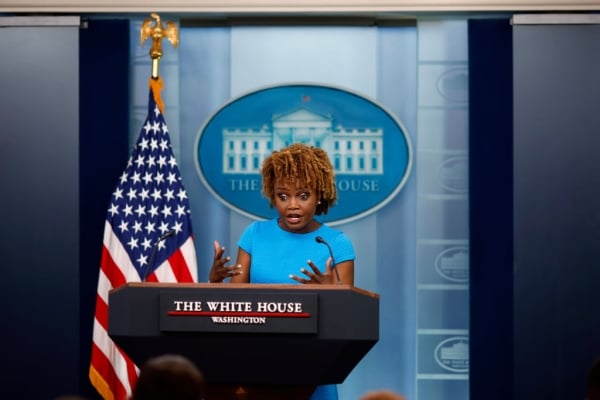
Photo by Kevin Dietsch/Getty Images
President Biden is “monitoring the situation closely,” White House press secretary Karine Jean-Pierre said at a press briefing Wednesday afternoon when asked why the president hasn’t commented on the last 48 hours of heightened campus protests.
“No president has spoken more forcefully about combating antisemitism,” Jean-Pierre said. “But he hasn’t just done that by speaking. He’s taken action by moving forward with the first ever national strategy to counter antisemitism.”
When reporters asked about Biden’s stance on violence incited by pro-Israel counter-protesters at UCLA, the press secretary said, “Any form of violence, we are going to denounce.”
As far as whether or not Biden supports the deployment of police at Columbia, Jean-Pierre said Americans have the right to peacefully protest as long as it’s within the law.
“Forcibly taking over a building is not peaceful, it’s just not,” she said. “A small percentage of students should not be able to disturb or disrupt the academic experience.”
—Jessica Blake, 2:55 p.m.
Columbia Moves Exams Online
Columbia University announced Wednesday that all final exams scheduled on the main campus will now be fully remote “in order to address the concerns of our members in an evolving campus environment,” according to an email to students Wednesday afternoon.
Faculty and staff had already been advised to provide hybrid exam options to accommodate students who may not feel safe returning to campus amid the ongoing pro-Palestinian protests. Now, officials are further tightening restrictions, noting that even faculty teaching graduating seniors in practice-based programs that require specialized equipment must get permission from the dean of their school to conduct exams in person.
The exam schedule has also changed.
Exams were set to begin this Friday, May 3, but now will be automatically rescheduled for Friday, May 10. All nontimed, nontesting assessments, including final papers, presentations, projects, or take-home exams, will now be due on or after May 6.
The deadline for grade submissions has been bumped back from May 10 to 13.
—Jessica Blake, 2:10 p.m.
Sacramento State Extends Encampment Deadline
Administrators at Sacramento State University have extended approval for an encampment that pro-Palestinian protesters established on Monday. The encampment was initially approved until midnight on May 1, but university officials said in a statement that the deadline “will be extended as long as the encampment stays peaceful and within the University’s Time, Place & Manner Restrictions on Speech and Speech-Related Activities policy.” The statement also noted that three students not involved with the encampment had been cited for vandalism on Monday night.
—Josh Moody, 2:00 p.m.
New Statements by Mayor Adams and President Shafik
Mayor Eric Adams on Wednesday defended the overnight arrests of nearly 300 campus protesters in New York City. He praised the police and argued that protesters were antisemitic. https://t.co/g4bmEFcb6O pic.twitter.com/5kMzVJrty7
— The New York Times (@nytimes) May 1, 2024
At a press conference Wednesday morning, New York City Mayor Eric Adams praised the New York Police Department for its discipline, precision and restraint in carrying out approximately 300 arrests at Columbia University and the City College of New York the night before.
He went on to blame much of the disruption at both campuses on “external actors with a history of escalating situations and trying to create chaos.”
From early on, the protests “just did not sit right,” Adams said. “I know that there are those who are attempting to say, ‘Well the majority of people may have been students.’ But you don’t have to be the majority to influence and co-opt an operation.”
“This is a global problem that young people are being influenced by those who are professionals at radicalizing our children, and I’m not going to allow that to happen to our city as the mayor of New York,” he added.
Adams also noted that he deployed the NYPD only under direct request from Columbia officials and “their acknowledgement that outside agitators were on their grounds.”
Neither city nor university officials have named the outside actors they blame for the unrest.
Columbia President Shafik also put out a statement in response to the police intervention. She noted that the university’s leaders have been “patient in tolerating unauthorized demonstrations,” conducting hours of dialogue with students in search of a compromise. But after they failed to reach a resolution and protesters “pushed the University to the brink” by occupying Hamilton Hall, she had to act.
“I know I speak for many members of our community in saying that this turn of events has filled me with deep sadness. I am sorry we reached this point,” Shafik wrote. “It is going to take time to heal, but I know we can do that together. I hope that we can use the weeks ahead to restore calm, allow students to complete their academic work, and honor their achievements at Commencement.”
—Jessica Blake, 1:00 p.m.
UW-Madison Tents Removed, Protesters Vow to Regroup
A wave of students from the University of Wisconsin at Madison collided with a line of county sheriff deputies and state patrol troopers Wednesday morning, a video from local reporter Tim Elliot shows.
From the mass of protesters comes a cry in unison: “Students, students hold your ground! State patrol back down!”
According to a student newspaper, The Daily Cardinal, officers arrived at about 6:50 a.m. and gave protesters 15 minutes to remove their tents from the flagship’s Library Mall, warning that any who declined to comply would face “law enforcement action.”
Protesters in the encampment, which was led by the UW-Madison chapter of Students for Justice in Palestine, had just completed their second overnight stay, in violation of a university policy that bars camping on campus without permission.
Of the 37 tents on the campus Mall before police arrived, only two remained standing by 9:30 a.m., according to the Cardinal. But an SJP spokesperson told local reporters that the protesters aren’t going anywhere, and plan to bring more tents to the lawn to replace those forcibly torn down.
Although it is unclear exactly how many students were arrested, posts on X show both students and faculty being detained with zip-tie handcuffs as they continued to chant, “Free, free Palestine.”
—Jessica Blake, 12:10 p.m.
Tulane Encampment Removed, Officials Say
In a statement Wednesday morning, Tulane University officials confirmed that all pro-Palestinian encampment protesters have been removed from campus.
The dismantling, much like those at Columbia University and the City College of New York, took place in the middle of the night. University officials said they issued numerous warnings, granting protesters plenty of opportunities to leave voluntarily before university, city and state police, as well as SWAT officers, arrived.
#BREAKING SWAT has moved in on Tulane’s campus with guns drawn and tossing the demonstrators things.
— Jonah Gilmore (@JonahMGilmore) May 1, 2024
They told them this is the final time to leave peacefully @wdsu pic.twitter.com/ina2u8be5Q
Like their counterparts elsewhere, Tulane officials noted that, “the overwhelming majority of the protesters are unaffiliated with our community.” The statement said that at least 14 protesters have been arrested, only two of whom they identified as Tulane students. Six people were arrested at Tulane on Monday.
“Today’s action was carefully planned and coordinated over the past few days with the goal of keeping the protestors and our community safe while returning our campus to normal operations,” the statement read. “Free speech and the freedom to protest are sacred … However, we remain opposed to trespassing, hate speech, [and] antisemitism … Organizers of protests need to know we will not tolerate these things.”
Wednesday is the last day of classes, but police and security will remain on campus for the remainder of the semester, which ends with commencement on May 18.
Louisiana Governor Jeff Landry, a Republican, voiced support for the university’s decision. “My appreciation goes out to [the university and police officials involved] for safely clearing the Tulane campus of those who sought to illegally occupy the campus!,” Landry said in a public statement. “Many colleges across our country may allow this lawlessness, but Louisiana will NOT.”
—Jessica Blake, 11:50 a.m.
Arrests at the University of Arizona
Police arrested pro-Palestinian protesters on the University of Arizona campus after they refused to leave their encampment Tuesday by 10:30 p.m., the curfew set by the university, according to the Arizona Daily Star. Ahead of the deadline, protest organizers surrounded the encampment with barricades and distributed supplies for students to use if they were hit by pepper spray or tear gas.
Officers entered the encampment at 10:55 p.m., at which point protesters fought back by throwing objects, such as water bottles, at the officers. However, police did not make any arrests until around 2 a.m. Wednesday, according to the Star, at which time they used “non-lethal” chemical weapons on protesters.
The university released an announcement at that time that read: “University of Arizona President Robert C. Robbins has directed University officials and the University of Arizona Police Department, to immediately enforce campus use policies and all corresponding laws without further warning. The UAPD is supported by members of the Tucson Police Department, Pima County Sheriff’s Office and the state’s Department of Public Safety. The University will continue to act in the best interests of our students, faculty and staff to ensure their safety.”
By 2:50 a.m., the encampment was empty.
Demonstrators at first protested on UA’s central mall on Monday, but the university warned that anyone on the mall for nonacademic reasons after 10:30 p.m. would be arrested for trespassing, according to the university’s student newspaper, The Daily Wildcat, noting that students then opted to leave. After the protesters left late Monday night, officials blocked the mall with fences, but protesters returned to create a new encampment Tuesday afternoon.
—Johanna Alonso, 10:50 a.m.
After Police Clear Hamilton Hall, a Quiet Morning at Columbia
About 230 students were arrested at Columbia University on Tuesday night as dozens of officers from the New York Police Department breached Hamilton Hall, where pro-Palestinian protesters had barricaded themselves nearly 24 hours before.
First, police broke up lines of demonstrators linked arm-in-arm surrounding the building. Then they went in after the occupiers inside. Dressed in riot gear and bearing plastic zip tie handcuffs on their belt, the officers swept the building, entering first through a second-story window and side entrance before storming through the front doors. Steadily, the silhouettes of protesters began to disappear from Hamilton Hall’s windows, where they had been seen waving Palestinian flags throughout the day and into the night. Many were funneled into law enforcement vehicles and caravanned away from campus.
Dozens of additional arrests were also made just a few blocks uptown at the nearby City College of New York, where protesters tried—and failed—to take over an administrative building. In all, police estimate they arrested about 300 protesters from both Manhattan campuses.
The tents are gone, but they left their mark. pic.twitter.com/Y1K3qkXC6v
— Irie Sentner (@iriesentner) May 1, 2024
Now at Columbia, both Hamilton Hall and the campus lawn, which formerly hosted a sea of encampment tents, are empty. The Morningside Heights campus continues to remain on lockdown, accessible only to students who live in on-campus dorms and employees who provide essential services.
Just last Friday Columbia President Minouche Shafik said it would be counterproductive to bring police back to campus, given that their presence last week only stoked more protests, both at Columbia and on campuses around the nation. But she seemed to reverse her stance entirely Tuesday night, writing a letter to the NYPD in which she called for city police to remain on campus until after the May 15 graduation ceremony.
When asked whether police would meet Shafik’s request, a law enforcement official told CNN the department is still determining how long and in what capacity officers will stay.
—Jessica Blake, 10 a.m.
At UCLA, Scuffles Turn Into Brawl
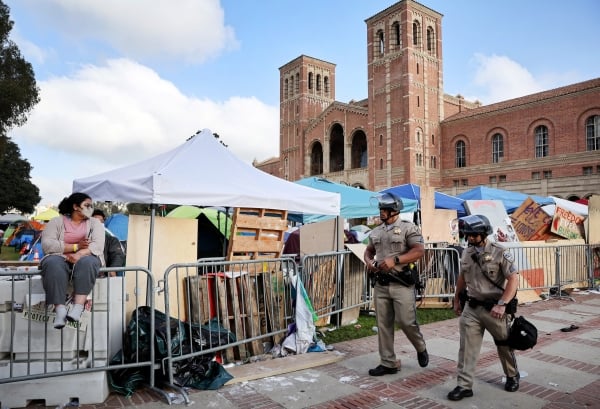
Officers patrol a pro-Palestinian encampment at UCLA the day after it was attacked by counter-protesters.
Mario Tama/Getty Images
What had been mostly minor scuffles between pro-Israel and pro-Palestinian protesters at the University of California, Los Angeles, erupted into an all-out violent clash Tuesday night.
Videos show masked individuals running up to the barricaded pro-Palestinian encampment just outside Powell Library a little before 11 p.m. and shooting fireworks at the peaceful demonstrators.
Local media reported that pipes, wooden planks, tasers and pepper spray were all deployed as the confrontation raged on one of the university’s main quads. But unlike at many other protest sites across the country, law enforcement officers were notably absent.
Campus police along with medical personnel showed up briefly before retreating, according to KTLA5. A representative of California Governor Gavin Newsom’s office said in a post on X that “Law enforcement leaders are in contact regarding the violence at UCLA this evening, and resources have been mobilized.”
A Zionist mob attacked the UCLA encampment last night beating students, launching fireworks into the encampment, pepper spraying students, and throwing tear gas canisters. This is a scene out of the West Bank happening on an American campus. pic.twitter.com/yzLkTVRa20
— Alejandra Caraballo (@Esqueer_) May 1, 2024
According to The Los Angeles Times, officers in riot gear arrived at about 1:40 a.m. Even then, the police did not immediately break up the clashes at the encampment. It wasn’t until about 3 a.m. that officers began to push the remaining counter-protesters out of the quad area. They told people to leave or face arrest.
The number of arrests and injuries from the brawl remain unclear.
“Horrific acts of violence occurred at the encampment tonight, and we immediately called law enforcement for mutual aid support,” UCLA vice chancellor Mary Osako said in a statement. “The fire department and medical personnel are on the scene. We are sickened by this senseless violence and it must end.”
The night’s events unfolded shortly after UC President Michael Drake released a statement Tuesday evening supporting the university’s decision to label the encampment unlawful, adding that “when it threatens the safety of students, or anyone else, we must act.”
All classes were canceled Wednesday “due to the distress caused by the violence that took place on Royce Quad late last night,” officials said in a post on X, advising students and community members to continue avoiding the quad.
A statement on the university’s website said that Royce Hall and Powell Library, two key buildings on the quad, will remain closed through at least the end of the week.
—Jessica Blake, 9:15 a.m.
Outside Agitators at UT Austin
The University of Texas at Austin said late Tuesday that most of the people arrested after a campus protest on Monday “had no affiliation” with the university and that officers had confiscated guns, rocks and “steel-enforced wood planks.
“These numbers validate our concern that much of the disruption on campus over the past week has been orchestrated by people from outside the University, including groups with ties to escalating protests at other universities around the country,” the university’s statement said.
Texas officials said that 45 of the 79 people arrested Monday were unaffiliated with the university. They also said that employees had been assaulted and threatened and police officers had been “headbutted and hit with horse excrement.”
“This is calculated, intentional and, we believe, orchestrated and led by those outside our university community,” the statement said.
—Doug Lederman, 8:19 a.m.
More Updates on Campus Protests

